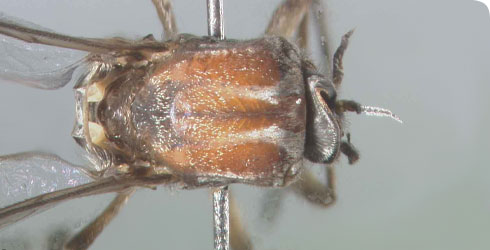Female Simulium rubrithorax
General body colour orange/brown and black. Body length (specimens pinned) 2.9-3.9 mm (mean = 3.5mm, s.d. = 0.29, n = 10); wing length 3.2-4.6mm (mean = 3.8mm, s.d. = 0.4, n = 18), wing width 1.4-1.9mm (mean = 1.7mm, s.d. = 0.4, n = 16).
Head
- Dichoptic with red eyes showing golden highlights; nudiocular area well developed.
- Frons, clypeus and occiput dark brown with silver pruinosity; frons with numerous, irregularly arranged, stout hairs predominantly on margins.
- Antennae brown with scape, pedicel and basal third of first flagellomere yellow. Mouthparts dark brown.
- Cibarium unarmed with lightly sclerotised margin of trough and highly sclerotised cornuae
Thorax
- Scutum predominantly orange-brown with numerous, recumbent, golden hairs. Scutal pattern varying in appearance with illumination. With anterior illumination, thorax dark brown with following areas grey-silver pruinose
- Wide median vitta originating as triangle with base on anterior margin, expanding to drop-shaped extending for nine tenths of scutum, divided longitudinally by fine, dark brown line; pair of lateral vittae beginning at anterior fifth of scutum and extending for nine tenths of its length; lateral border of scutum grey pruinose.
- With posterior illumination grey pruinose and brown areas become reversed, previously pruinose vittae appear dark brown and dark brown background silver-grey pruinose; posterior margin greyish black.
- Humeri orange-brown.
- Paranotal folds dark brown with silver pruinosity.
- Pleural region dark, mottled orange-brown with grey pruinosity; prominent patch of long, golden hairs on pronotum; pleural tuft of prominent, golden hairs.
- Scutellum mid brown with light pruinosity and numerous, long, recumbent, golden hairs and long, dark hairs on outer margins.
- Postnotum dark brown with grey pruinosity.
- Subcostal wing vein with row of 4-6 setae in basal half; many sensilla in basal area.
- Basal fourth of Radius bare; following fourth with irregular row of predominantly (or solely) fine setae; next quarter with irregular row of both fine and stout setae; distal fourth with regular row of mainly stout setae (total of 40-48 fine setae and 22-25 stout setae). Basal tuft of dark hairs.
- Colour and proportions of legs as in Fig. 501. Legs yellow with following dark areas: fore leg with distal sixth of femur, basal quarter and distal fifth and outer margin of tibia, basitarsus and tarsi dark brown; mid leg with coxa, distal sixth of femur, distal fourth, sub-basal spot and outer margin of tibia black; distal two fifths of basitarsus and other tarsal segments dark brown; hind leg coxa black, distal quarter of femur, all of tibia except basal articulation and median quarter, distal half of basitarsus black; distal half of first tarsomere and remaining tarsi dark brown. Claw of hind leg curved with large basal tooth.
- Halteres pale yellow with slightly darkened stems.
Abdomen
- Tergites predominantly black, but mottled orange-brown; tergite I velvet yellow/black with fringe of long golden hairs; tergite II velvet black with anterior half mottled with rust coloured patches; tergites III, IV velvet-black; tergites V-IX shiny black. Tergal plates sclerotised as in S. exiguum.
- Sternites mid to pale brown. Genitalia brown. Eighth sternite with well sclerotised central plate and 1+1 groups of 11-13 well developed setae; gonapophyses large and well developed, sub-triangular, covered in setae with some sclerotisation on lower surface.
- Cercus hemispherical, but slightly flattened on outer surface; paraproct rectangular, membranous and setose, ventral extension one and a half times longer than cercus, ovoid, and covered in fine setae.
- Genital fork (Fig. XX) highly sclerotised with well developed anterior and posterior processes, end of stem spatulate.
- Spermatheca oval, strongly sclerotised without external sculpturing and spicules in rows; width of membranous area of insertion of spermathecal duct small, about quarter maximum width of spermatheca.
